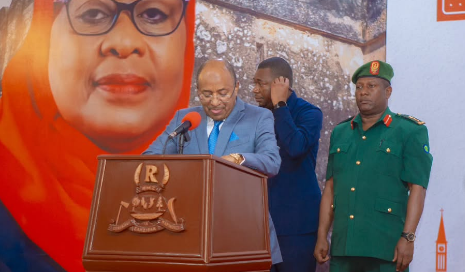Architects urged to value culture, sustainability

ZANZIBAR: ZANZIBAR President Dr Hussein Mwinyi has called on architects across East Africa to embrace designs that reflect the region’s culture, respect the environment and utilise modern technology.
Dr Mwinyi was speaking on behalf of President Samia Suluhu Hassan at the opening of a two-day seminar and General Assembly organised by the East Africa Institute of Architects (EAIA) in Zanzibar under the theme, “The Evolution of Architecture in Tanzania and East Africa (1860– 2025): Shaping the Future.”
“We need designs that are not only technologically advanced but also sensitive to our cultural heritage and the environment,” said President Mwinyi.
He stressed the importance of collaboration and expert consultation to ensure that the region fully benefits from architectural development. President Mwinyi noted that both Union and Zanzibar governments are actively involving architectural professionals in national development.
“These efforts include providing enabling environments for self-employment, revitalising apprenticeship programmes, allocating budgets for research and innovation and promoting local expertise in major construction projects,” he said.
He said that architects, engineers and quantity surveyors play a vital role in national economic development and should be given special consideration.
“The strategic projects in our countries must involve local professionals to ensure sustainability and national ownership,” he said.
President Mwinyi also addressed persistent challenges in the sector, including insufficient collaboration between public and private sectors, outdated policy implementation and the influx of foreign architectural work that excludes local experts.
He called for better platforms for young and emerging architects to grow, innovate and contribute meaningfully.
“This seminar is a vital platform to explore opportunities and find solutions to the challenges you face,” he added. “Let it be a space for exchanging knowledge and building stronger networks.”
President of the Architects Association of Tanzania (AAT), Mr Mike T’Chawi offered a powerful keynote speech tracing the evolution of architectural practice in East Africa.
Highlighting the shift from colonial hand-built structures to modern designs using Artificial Intelligence (AI), Building Information Modelling (BIM) and sustainable energy, T’Chawi said the region is now at the forefront of architectural transformation.
“This is not just a routine gathering. It is a historic moment for Tanzania and Zanzibar. It has been 121 years since a summit of this magnitude was last held here,” he said, noting that Tanzania was officially taking over the chairmanship of EAIA from Kenya.
He outlined key discussions planned for the summit, including architectural training for the next generation, balancing profession and personal life and the importance of preserving East Africa’s historical architecture in places like Zanzibar and Bagamoyo.
ALSO READ: Zanzibar secures grant to boost clean water access
T’Chawi urged for more government recognition of architects’ contributions, especially in projects where their role is often overlooked in favour of engineers.
He also warned against unethical practices such as underpricing consultancy services to win tenders, which compromise quality and integrity.
He thanked both Tanzanian governments for involving local professionals in infrastructure projects, calling for continued support and better enforcement of procurement standards.
Dr Khalid Salum Mohamed, Zanzibar’s Minister for Infrastructure and Communication, praised the gathering as a historic event that brought together leading architectural minds.
He lauded the keynote address by T’Chawi, saying it accurately reflected the profession’s potential in shaping cities and preserving heritage.
“This summit strengthens the relationship between the government and the architectural profession. It is a rare opportunity to align our goals and tap into the full potential of our local experts,” said Dr Khalid.
He reaffirmed the Revolutionary Government of Zanzibar’s commitment to supporting the use of registered architects in public projects and maintaining professionalism in the use of public resources.






979110 365923Actually your creative writing skills has encouraged me to get my own website now. Actually the blogging is spreading its wings rapidly. Your write up is a good example of it. 411500